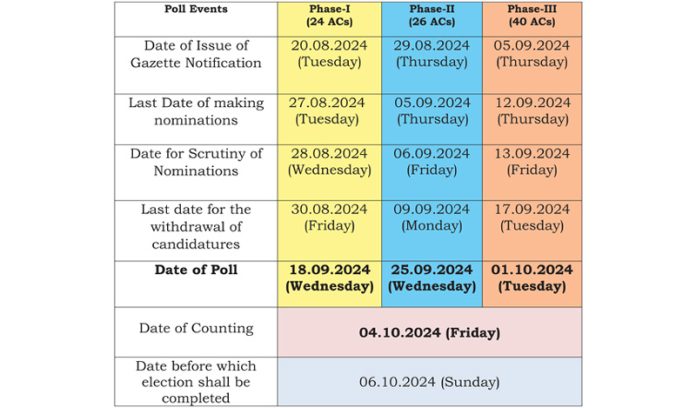Counting on Oct 4, MCC comes into force
*4 floating PSs to be set up on Dal lake, LoC
*Ease of voting for migrants to continue
Sanjeev Pargal
JAMMU, Aug 16: The Election Commission today announced three-phase Assembly elections in Jammu and Kashmir beginning September 18 and concluding with counting on October 4 in which nearly 88 lakh voters will be eligible to exercise their right to franchise for 90 constituencies including nine reserved for the first time for Scheduled Tribes (STs) and seven for SCs like the last Assembly.
Follow the Daily Excelsior channel on WhatsApp
This will be the first Assembly election after Jammu and Kashmir became a UT and abrogation of Article 370 on August 5, 2019. Also for the first time, there will be no participation of Ladakh in the J&K Assembly. Ladakh had four Assembly seats.
Of 90-seat Assembly, 47 are in Kashmir division and 43 in Jammu division. This is after nearly a decade that the Assembly elections are being held in Jammu and Kashmir, the last being in November-December 2014.
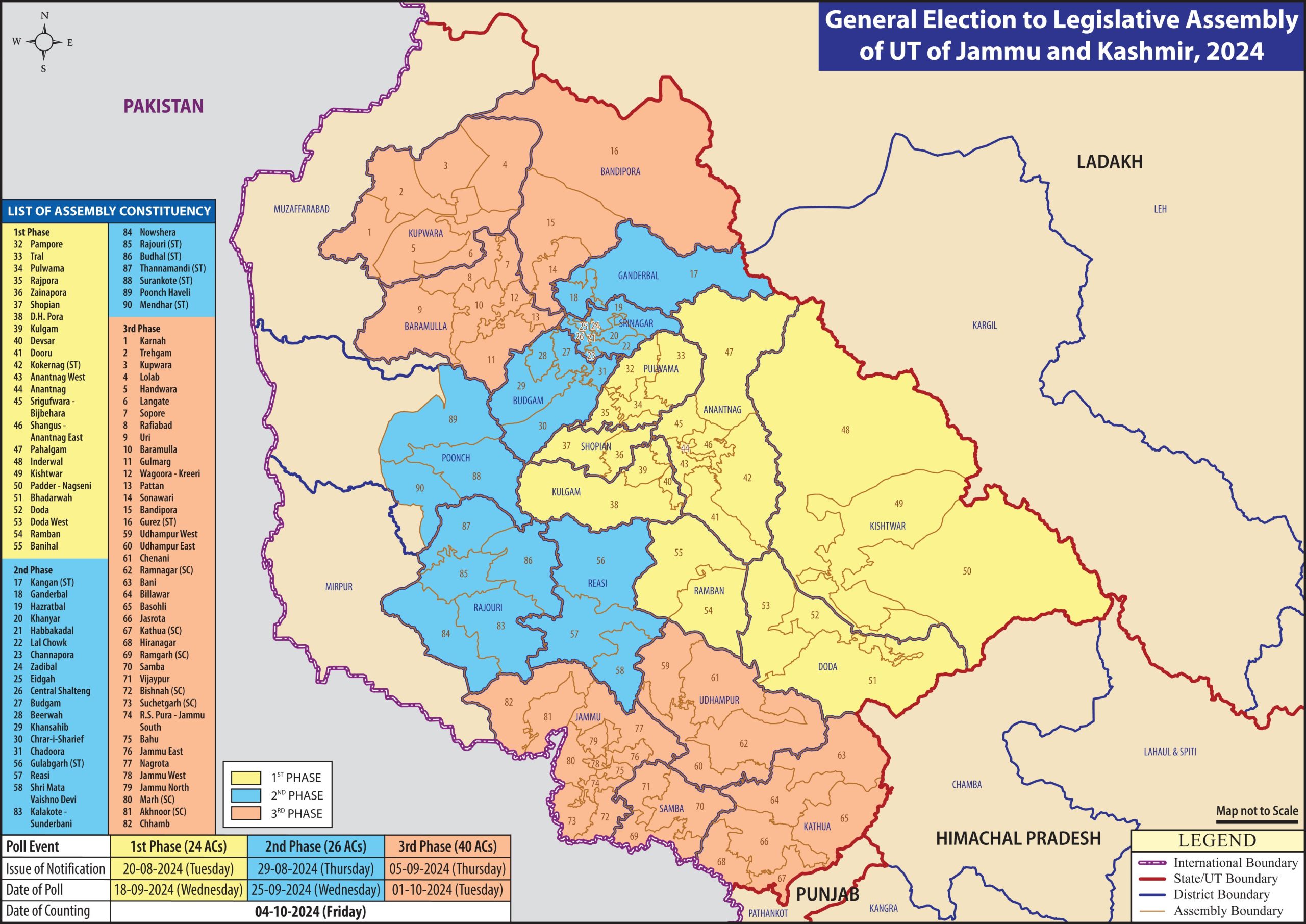
Generally, Assembly elections in J&K are held in four to five phases after outbreak of militancy. This, however, is shortest three-phase election schedule announced today by the EC. Last Assembly polls in 2014 and April-May 2024 Parliamentary polls were held in five phases. Soon after announcement of the elections, the Model Code of Conduct (MCC) has come into force in the UT.
The three-phase elections will be held on September 18, September 25 and October 1 while counting will take place on October 4 and entire process of elections will be over on October 6.
In the last Assembly in J and K in 2014, the BJP had won 25 of its 87 seats and had joined hands with the PDP which had 28 seats to form the Government under the leadership of Mufti Mohammad Sayeed. BJP withdrew support to PDP’s Mehbooba Mufti-led Government in June 2018 and since then J&K is without an elected Government.
“We had promised the shortest Assembly poll schedule and we stand by our promise,” CEC Rajiv Kumar said at a press conference in Union capital.
Out of 90 Assembly constituencies, 74 are general while nine are reserved for STs and seven for SCs. There are 87.09 lakh electors of which 44.46 lakh are male and 42.36 lakh are females. However, final electoral rolls will be published on August 20. There are 11838 total polling stations including 2332 in urban and 9506 in rural areas with each polling station averaging 735 electorates.
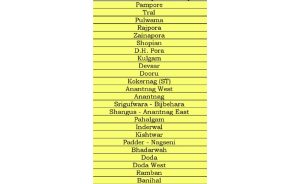
“In Lok Sabha polls in J&K, there was a belief over cynicism. There was a thriving political participation in the polls and intense campaigns. There is a bit of change in the security situation but that won’t affect the democratic process,” the CEC flanked by ECs Gyanesh Kumar and S S Sandhu said adding they want to strengthen the layers of democracy.
He said that they expect there would be more voters this time. “We hope to see women and also youth participation as well. There should be vigorous campaigning as well.”
Rajiv Kumar said that they saw a great enthusiasm in Lok Sabha polls and there is a yearning for strengthening the democracy further.
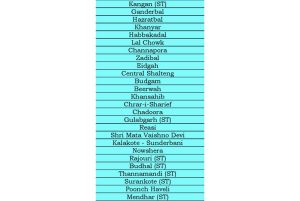
“We met every one in J&K and all of them wanted early polls,” Kumar said, adding that “In J&K, long queues reflected the power of democracy, they were not just long queues but people’s hopes and people scripting their own history. People had a message that they were in the queue not to vote only but to demonstrate a desire that democracy flourishes in their area.”
He said: “People of J&K wanted to write about their future themselves. People wanted to be part of the change and write their fortune. This was purely a triumph of ballot over bullet. Valley rejected violence and raised their voice through vote. They choose ballots over bullets.”
The seats going to poll in phase-one include Pampore,Tral, Pulwama, Rajpora, Zainapora, Shopian, D.H. Pora, Kulgam, Devsar, Dooru, Kokernag (ST), Anantnag West, Anantnag, Srigufwara – Bijbehara, Shangus – Anantnag East, Pahalgam, Inderwal, Kishtwar, Padder – Nagseni, Bhaderwah, Doda, Doda West, Ramban and Banihal.
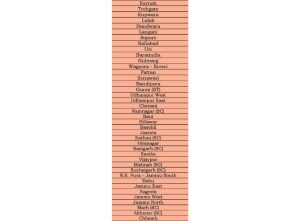
The seats which will witness elections in second phase include Kangan (ST), Ganderbal, Hazratbal, Khanyar, Habbakadal, Lal Chowk, Channapora, Zadibal, Eidgah, Central Shalteng, Budgam, Beerwah, Khansahib, Chrar-i-Sharief, Chadoora, Gulabgarh (ST), Reasi, Shri Mata Vaishno Devi, Kalakote – Sunderbani, Nowshera Rajouri (ST), Budhal (ST), Thannamandi (ST), Surankote (ST), Poonch Haveli and Mendhar (ST).
The seats which will have voting in third phase are Karnah, Trehgam, Kupwara, Lolab, Handwara, Langate, Sopore, Rafiabad, Uri, Baramulla, Gulmarg, Wagoora – Kreeri, Pattan, Sonawari, Bandipora, Gurez (ST), Udhampur West, Udhampur East, Chenani, Ramnagar (SC),Bani, Billawar, Basohli, Jasrota, Kathua (SC), Hiranagar, Ramgarh (SC) Samba, Vijaypur, Bishnah (SC), Suchetgarh (SC),R.S. Pura – Jammu South, Bahu, Jammu East, Nagrota, Jammu West, Jammu North, Marh (SC),Akhnoor (SC) and Chhamb
Kumar said the Assembly polls in Jammu and Kashmir are being held “well within the time period” and will be completed in time against the backdrop of the September 30 deadline set by the Supreme Court to hold the democratic exercise in the UT.
He said after the Parliamentary polls concluded on June 4, the Poll Panel waited for the completion of the Amarnath Yatra on August 19. The notification for the first phase in Jammu and Kashmir will be issued on August 20, a day after the Yatra concludes.
Kumar said the Election Commission also had to keep in mind the weather in the UT.
“There is no way one could have gone exactly on the day, which is 19th (August 19). We are not giving even half a day when one could have started. And it is well within time period and it will be finished in time.
“So, it is not a day here and there which is important. What is important is that we go by the spirit … The amendments to the J&K Reorganisation Act in terms of providing reservations came in December 2023. So the period started ticking for the Commission to start it only in December 2023. Then came the parliamentary elections. So we are not delayed at all,” he explained.
Meanwhile, the Model Code of Conduct came into force with the announcement of poll schedule for the Assembly elections in J&K, the officials said.
The MCC comes into effect with the announcement of elections by the Commission. All provisions of the Model Code will apply to Jammu and Kashmir, covering all candidates, political parties, and the Government, the officials said.
They said the MCC will apply to the Union Government as well with respect to any announcements or policy decisions related to Jammu and Kashmir.
Following the enforcement of the MCC, the ECI directed UT’s Chief Electoral Officer and Chief Secretary to take immediate action for the enforcement of the MCC.
The directions included taking immediate action in case of defacement of Government property, misuse of official vehicle, and advertisement at the cost of public exchequer among others.
To ensure “no voter is left behind” in Jammu and Kashmir, the Election Commission will set up three floating polling stations on the Dal Lake and one along the LoC to “exclusively” serve an area that has 100 per cent ST population.
Kumar said the intent to set up these “unique” polling stations was to ensure accessibility in otherwise unreachable areas.
For the three floating polling stations on the Dal Lake, the polling team are taken on ferries and shikaras.
“One of the three polling stations, Khar Mohalla Aabi Karpora, has only three voters,” he added.
The Koragbal polling station in the Gurez assembly constituency is situated along the Line of Control (LoC) between Indian and Pakistani territories.
“It exclusively serves a 100 per cent Scheduled Tribe (ST) population. In the Lok Sabha elections, the polling station had recorded a voter turnout of 80.01 per cent,” he said.
Seemari is the first polling station in Kupwara district.
“It consistently achieves high voter turnout despite logistical and security challenges,” Kumar added.
The ease of voting for Kashmiri migrants introduced during the recent Lok Sabha polls will be in place for the Assembly polls as well, Kumar said.
Talking about the special arrangements made for the Kashmiri migrants during the Lok Sabha polls, Kumar said those relaxations will continue.
“You may also remember that for Kashmiri migrants, special arrangements were made. We simplified the process, we relaxed Form M and there were some cumbersome processes that required authorisation, which were converted to self-attestation,” the CEC said.
“We got positive results and the migrants also participated,” he added.
Kumar highlighted that the Union Territory witnessed more than 58 per cent voting during the Lok Sabha polls and this record participation of voters was a testament to Jammu and Kashmir’s democratic spirit.
“The long queues at the polling booths of Jammu and Kashmir were an excellent example of the power of democracy. It was their desire to write a new destiny,” he said.
“Everybody wanted to participate, prove a point that we are here in this queue not only to vote but to demonstrate the very strong desire that democracy flourishes in this area,” the CEC added.
Kumar pointed out that there was no incident of re-polling and an amount of nearly Rs 100 crore was seized.
Ahead of the Lok Sabha election, the Election Commission (EC) had announced that Kashmiri migrants from Jammu and Udhampur districts of Jammu and Kashmir would no longer be required to fill up “Form M” to vote as the poll panel had ordered changes to the existing voting scheme for the displaced people.
Instead, they shall be mapped with special polling stations falling in the zones where they are registered or residing, the commission had said.
Earlier, filling up the form was mandatory for the voters displaced from the valley ahead of every Parliamentary and Assembly election.
The EC had also eased the process of filling up “Form M” for the Kashmiri migrants staying in Delhi and other places in the country by allowing self-attestation instead of the certification by gazetted officers required earlier.


